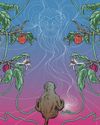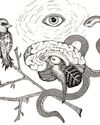
I read Friedrich Nietzsche with a mixture of admiration, amusement, outrage, and exasperation. His philosophy is the antithesis of the kind of philosophy I usually like to read and to do (that is to say, analytic philosophy), and I cannot read him for very long at a stretch. It’s like listening to a man talking at the top of his voice all the time, and it becomes wearisome. But his writing is extremely rich, stimulating, and crammed with ideas.
One particular idea of his has always intrigued me: the idea of eternal recurrence (or eternal return, as it is also known). It is a bizarre, fanciful, poetic idea, and it occurred to me that applying the methods of analytic philosophy to it might be a fruitful marriage between the analytic and the so-called Continental traditions.
Infinite Reflections
First, let’s look more closely at the idea. It’s mentioned a number of times in Nietzsche’s works. It crops up in Thus Spoke Zarathustra (1883-5), for example, where Zarathustra repeats seven times this incantation: “Oh, how should I not lust for eternity and for the wedding ring of rings – the Ring of Recurrence! Never yet did I find the woman by whom I wanted children, unless it be this woman, whom I love: for I love you, O Eternity! For I love you, O Eternity!” However, the idea is not fully examined or explored there: instead one is supposed to ponder its implications for oneself.
The fullest treatment of eternal recurrence appears in The Joyous [Gay] Science (1882):
This story is from the {{IssueName}} edition of {{MagazineName}}.
Start your 7-day Magzter GOLD free trial to access thousands of curated premium stories, and 9,000+ magazines and newspapers.
Already a subscriber ? Sign In
This story is from the {{IssueName}} edition of {{MagazineName}}.
Start your 7-day Magzter GOLD free trial to access thousands of curated premium stories, and 9,000+ magazines and newspapers.
Already a subscriber? Sign In

Anselm (1033-1109)
Martin Jenkins recalls the being of the creator of the ontological argument.

Is Brillo Box an Illustration?
Thomas E. Wartenberg uses Warhol's work to illustrate his theory of illustration.

Why is Freedom So Important To Us?
John Shand explains why free will is basic to humanity.

The Funnel of Righteousness
Peter Worley tells us how to be right, righter, rightest.

We're as Smart as the Universe Gets
James Miles argues, among other things, that E.T. will be like Kim Kardashian, and that the real threat of advanced AI has been misunderstood.

Managing the Mind
Roger Haines contemplates how we consciously manage our minds.

lain McGilchrist's Naturalized Metaphysics
Rogério Severo looks at the brain to see the world anew.

Love & Metaphysics
Peter Graarup Westergaard explains why love is never just physical, with the aid of Donald Davidson's anomalous monism.

Mary Leaves Her Room
Nigel Hems asks, does Mary see colours differently outside her room?

From Birds To Brains
Jonathan Moens considers whether emergence can explain minds from brains.